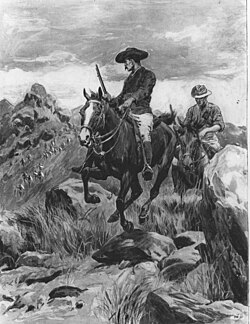Second Matabele War
| Second Matabele War | |||||||
|---|---|---|---|---|---|---|---|
| Part of the Matabele Wars | |||||||
 Depiction of Burnham and Armstrong after the assassination of Mlimo. Ndebele warriors in hot pursuit, drawn by Frank Dadd. |
|||||||
|
|||||||
| Belligerents | |||||||
|
|
Ndebele (Matabele) Shona |
||||||
| Commanders and leaders | |||||||
|
Robert Baden-Powell Frederick Carrington Cecil Rhodes |
Mlimo † Sikombo Inyanda |
||||||
| Casualties and losses | |||||||
| ~400 | ~50,000 | ||||||
The Second Matabele War, also known as the Matabeleland Rebellion or part of what is known in Zimbabwe as the First Chimurenga, was fought between 1896 and 1897 in the area then known as Rhodesia, now Zimbabwe. It pitted the British South Africa Company against the Ndebele (Matabele) people, which led to conflict with the Shona people in the rest of Rhodesia.
In March 1896, the Ndebele revolted against the authority of the British South Africa Company in what is now celebrated in Zimbabwe as the First Chimurenga. The Mlimo (or M'limo, or Umlimo) the Ndebele spiritual leader, is credited with fomenting much of the anger that led to this confrontation. He convinced the Ndebele and the Shona that the settlers (almost 4,000 strong by then) were responsible for the drought, locust plagues and the cattle disease rinderpest ravaging the country at the time.
The Mlimo's call to battle was well-timed. Only a few months earlier, the British South Africa Company's Administrator General for Matabeleland, Leander Starr Jameson, had sent most of his troops and armaments to fight the Transvaal Republic in the ill-fated Jameson Raid. This left the country nearly defenceless. The British immediately sent troops to suppress the Ndebele and the Shona, but it cost the lives of many on both sides. Months passed before the amount of British forces were adequate to break the sieges and defend the major settlements, and war raged on until October of the following year.
The Mlimo planned to wait until the night of 29 March, the first full moon, to take Bulawayo by surprise immediately after a ceremony called the Big Dance. He promised, through his priests, that if the Ndebele went to war, the bullets of the settlers would change to water and their cannon shells would become eggs. His plan was to kill all of the settlers in Bulawayo first, but not to destroy the town itself as it would serve again as the royal kraal for the newly reincarnated King Lobengula. The Mlimo decreed that the settlers should be attacked and driven from the country through the Mangwe Pass on the Western edge of the Matobo Hills, which was to be left open and unguarded for this reason. Once the settlers were purged from Bulawayo, the Ndebele and Shona warriors would head out into the countryside and continue the slaughter until all the settlers were either killed or had fled.
...
Wikipedia
